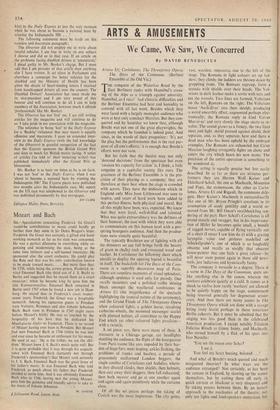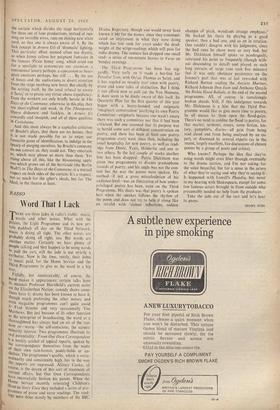ARTS & AMUSEMENTS
We Came, We Saw, We Concurred
By DAVID BENEDICTUS MNE conquest of the Waterloo Road by the I East Berliners ranks with Hannibal's cross- ing of the Alps as a triumph against adversity.
Hannibal, as I recal' had climatic difficulties and
the Berliner Ensemble had heat and humidity to contend with all last week. Besides which they
were faced with a largely monoglot audience who were at best only armchair Marxists. But they con- quered and by Saturday we knew that, although
Brecht was not one of the great playwrights, the company which he founded is indeed great. And since, in the words of their progenitor: 'It's not the play but the performance that is the real pur- pose of all one's efforts,' it is enough that Brecht's' efforts were not vain.
But his faith that the theatre may not only 'demand decisions' from the spectator but even 'awaken his capacity foraction' is, I think, a little sanguine in a capitalist society like ours, The greatness of the Berliner Ensemble is in the pre- cision of their playing as a company; they are therefore at their best when the stage is crowded with actors. They have the dedication which in England only Miss Joan Littlewood was seen to inspire, and years of hard work have added to this perfect fitness, both physical and moral. But all this might have been,-was, expected. We knew that they were loyal, well-drilled and talented. What was quite extraordinary was the deftness of their humour, the ease with which they were able to communicate on this human level with a per- spiring bourgeois audience. And then the' produc- tions were visually quite beautiful.
The typically Brechtian use of lighting with all the dimmers set out full brings forth the beauty of grain in chalky rock and creosoted wood and
leather. In Coriolanus the billowing sheet which unrolls to display the opening legend is beautiful
in itself. The backcloth for The Days of the Com-
mune is a superbly decorative map of Paris. There are countless moments of visual splendour,
although opulence is used only for parody. One recalls mourners and a polished coffin shining black amongst the weathered tombstones in Arturo Ui (the magnificence of the spectacle highlighting the ironical nature of the ceremony), and the Grand Finale of The Threepenny Opera when coloured lights, a golden horse, revolving catherine-wheels, the mounted messenger scarlet with plumed helmet, all contribute to the Happy End which yet other coloured lights proclaim— with a twinkle.
' A set piece; yes, there were many of these. A massacre in a Chicago garage, car headlights dazzling the audience, the flight of the bourgeoisie from Paris (some like ants impeded by their bur- den of huge furs, nuns leaping, ankles flashing, the problems of trunks and bustles), a parade Of gruesomely malformed London beggars, the single combat of Coriolanus and Aufidius, where- in they discard cloaks, then shields, then helmets, then cast away their daggers, then fall exhausted.; then both recover and go at one another again and again and again pointlessly while the curtains close.
Of all the set pieces perhaps the taking of Corioli was the most impressive. The city gates,
vast, wooden, impassive, rise to the left of the stage. The Romans in light colours set up lad- ders; they climb; the ladders are thrown down by grappling irons. The Romans regroup, form a testudo with shields over their heads. The Vol- scians in dark leather make a sortie with nets and net the testudo. Two lines are formed, Volscians on the left, Romans on the right. The Volscians moan 'Au-li-di-us' into their shields, producing a weird unearthly effect, augmented perhaps elec- tronically; the Romans reply in kind. 'Cal-us Mar-ci-us' and very slowly the stage starts to re- volve. The sound grows to a frenzy, the two lines meet and fight, shield pressed against shield, then separate, and, as they separate, here and there a dead man who has been upheld by the embrace crumples. The Romans are exhausted but Caius March's laughing arrogantly fights on alone and enters the city which bears his new name, The precision of the entire operation is something to be wondered at.
The acting is equally precise but less easily described. In so far as there are virtuoso per- formers they are Herren Wolf Kaiser and Ekkehard Schall, the one as Macheath, Menenius and Papa, the stonemason, the other as Corio- lanus, Arturo IJi and Rigault, the commune dele- gate. Herr Kaiser's Macheath is extraordinarily like one of Mr. Bryan Pringle's creations in its assumption of seedy gentility and a world re- moved from Mr. Bill Owen's swashbuckling ren- dering of the part. Herr Schall's Coriolanus is all proud muscle and swagger, but in his impersona- tion of Hitler he becomes quite small, a bundle of ragged nerves, capable of flying vertically out of a chair (I swear I saw him do it) with a grating laryngitic voice and gestures modelled on Schickelgruber's, one of which is so laughably obscene and recalls so vividly that obscene house-painter that one feels a great release—he will never seem potent again in those old' news- reels, just ludicrous and hysterically funny.
The company is versatile to a degree. There is a scene in The Days of the Commune, quite un- like anything else in the canon, wherein the workers celebrate quietly at a caN. It conies as a shock to realise how rarely 'workers' are allowed to be quietly happy on the stage, contentment being reserved generally for degenerate aristo- crats. And then there are many scenes in The Threepenny Opera which are done with a savage biting irony learnt perhaps in those notorious Berlin cabarets. But it must be admitted that the singing was less good than in the celebrated American production. I except notably Friitilein Felicitas Ritsch as Ginny Jenny, and Macheath, who turned himself by a flick of his spats into Ivor Novello :
'You see the moon over Soho?
I see it You feel my heart beating, beloved . .
And what of Brecht's much quoted and much misquoted theories? In what ways are the audience estranged? Not certainly, as has been the custom in England, by slowing up the scenes themselves, but by cutting them off early (a quick curtain or blackout is very eloquent) and by taking pauses between them. By an honest approach to the mechanics of the theatre: not only are lights and loud-speakers unmasked, bui
the curtain which divides the stage horizontally for three out of four productions, instead of run- ning on invisible wires, runs on shining new white cord, so that one is always aware of it. By the lack (except in Arturo Ui) of 'dramatic' lighting. This particular effect seemed often too drastic, as when Jenny relives her poignant fantasies in the famous Pirate Jenny' song, which cried out for a spotlight to concentrate our attention, a sentimental luxury perhaps, a concession to bour- geois emotions perhaps, but still . . . By the use of boxes and the auditoriumoo divert attention from the stage (nothing new here). But chiefly by the writing itself, by the total refusal to create a 'hero,' or to praise any virtue above expediency. Even the workers are only briefly heroic in The Days of the Commune; otherwise in this play they are short-sighted and weak, in The Threepenny Opera dishonest and feckless, in.Arturo Ui cowardly and sheepish, and all of these qualities In Coriolanus.
And this must always be a capitalist criticism of Brecht's plays, that there are no heroes, that it is not made possible for us to enjoy our favourite game of identification, to indulge in the luxury of purging ourselves. So Brecht's company do not convert us, they could not. They entertain us, which may please us more than them. Yet rising above all this, like the blossoming apple tree which grows out of the barricade (the Berlin Wall?) in The Days of the Commune, is a mutual respect on both sides of the curtain. It's a respect,' not so much for the other's ideals, but for The Ideal, in the theatre at least.































 Previous page
Previous page